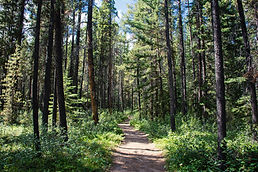

What is Forest School?

Forest School is an innovative educational approach that immerses learners in outdoor environments to foster holistic development. It focuses on hands-on experiences in nature following the agreed 6 Core Principles to encourage curiosity, creativity, and a deep connection with the natural world. Developed in Scandinavia in the 1950s, Forest School has gained popularity worldwide, particularly in the United Kingdom.
History of Forest School
The concept of Forest School originated in Denmark in the 1950s, where educators noticed the positive impact of outdoor learning on children's well-being and development. It was formalised in the 1980s in Sweden as Skogsmulle, a program aimed at preschool-aged children. This approach gradually spread across Europe, with the UK adopting it in the 1990s.
Development in the UK
Forest School gained traction in the UK during the 1990s when a group of nursery nurses visited Denmark to study their outdoor education practices. Inspired by what they saw, they introduced the Forest School concept to the UK, adapting it to suit the British educational context. Since then, Forest School has become an integral part of the educational landscape in the UK, with numerous schools and organizations offering Forest School sessions. Settings include nurseries, primary & secondary, SEND settings, home education groups, independent Forest School groups, babies and the elderly.
Benefits for Learners
Forest School offers many benefits to particpants of all ages. It promotes physical health and wellbeing by encouraging outdoor physical activities such as climbing, running, and exploring. Spending time in nature has been shown to actively reduce stress levels and improve mental health, leading to happier and healthier lives. Cognitive skills, such as problem-solving and critical thinking, in addition to managing risk are play a key role as learners navigate the challenges of the natural environment. As Forest School sessions are carried out over a sustained period of time, participants also develop a deep connection with nature and an understanding or their own place in the natural world, including their impact on it, learning how to become responsible custodians of the natural world for the future. Participants also regularly collaborate during activities, learning to develop their social and teamworking skills.

How is Forest School Carried Out?
Forest School sessions typically take place in wooded areas, parks, or natural reserves, where children have the opportunity to engage with the environment in a hands-on manner, although many inner-city settings do not have this luxury, there is still great benefit to getting outdoors and with a little creativity, Forest School can be carried out in urban settings.
Trained Forest School leaders facilitate these sessions, guiding learners through activities such as den-building, fire-making, wildlife observation, and woodland crafts. These activities are carefully planned to align with the developmental needs of the participants. Importantly, Forest School encourages child-centred learning, allowing participants to follow their own interests and explore the natural world at their own pace.